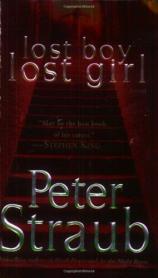Lost Boy Lost Girl
Review
Lost Boy Lost Girl
LOST BOY LOST GIRL is a novel that I fear is going to be lost, if
not ignored, in the plethora of releases that greet the autumn
season. This would be tragic, though not entirely without reason.
Peter Straub attracted major audiences with novels such as GHOST
STORY, SHADOWLAND and FLOATING DRAGON. He even co-wrote THE
TALISMAN with Stephen King. Then, for some reason, his audience ...
dwindled. Maybe it is due to the perception --- an erroneous one
--- that Straub was not writing Peter Straub novels anymore. In
fact, he was --- and is. But apart from a second collaboration with
King on BLACK HOUSE, which is both a sequel of sorts to THE
TALISMAN and a companion volume to King's DARK TOWER series, Straub
has not been heard from recently. And greater is the pity that few,
it seems, have noticed.
This is disappointing, because LOST BOY LOST GIRL is a novel that
succeeds on so many (occasionally) contradictory levels that it has
the potential to quietly become a classic over time. It may well be
one of those novels that "bubbles under" saleswise, never really
breaking into the all-important "charts" yet sailing along for
years and years without ever going out of print. In this age of
categorization, it is difficult to comfortably place LOST BOY LOST
GIRL. It is, possibly, a ghost story, or a romance, or a mystery,
or a thriller, even a domestic novel. Certainly it touches all of
those genres and perhaps others. It is so enigmatic a novel that
one almost overlooks how beautifully, wonderfully and fearfully
told it is.
Much of LOST BOY LOST GIRL is told from the viewpoint of Timothy
Underhill, a writer of some renown who leaves his home in New York
City and returns to his hometown of Millhaven. Underhill's
sister-in-law has committed suicide and his return to town for the
funeral opens fresh wounds in his tenuous relationship with his
brother, Philip. Philip is difficult at best, a man who seems to
be, though not actively evil, wholly without redeeming social
value. Mark, Philip's son and Timothy's nephew, is described as a
beautiful boy, a fifteen-year-old on the cusp of adulthood and
apparently unaware of the quiet magic his appearance and presence
has upon people.
Mark's disappearance a week after the funeral is like a second
death. Timothy returns again to Millhaven to doggedly search for
Mark, either to find him or to learn his ultimate fate. He quickly
learns that other boys have disappeared from the area and that Mark
had become obsessed with an abandoned house in his neighborhood, so
Timothy is thinking that there is a connection between the house
and the missing boys. There is also some indication that a
mysterious figure, somehow connected to the abandoned house, had
been quietly stalking Mark in the days preceding his disappearance.
Timothy slowly but painstakingly learns that Mark was discovering a
connection between the house and his own heritage, and that his
obsession with the house is awakening dangers from the past and the
present.
LOST BOY LOST GIRL is a novel that needs to be read and reread.
This may well be the best book of Straub's already brilliant
career. The ending is an enigmatic one and, I think, very
deliberately so. Straub has neatly crafted this tale so that any
one of a number of conclusions may or may not be correct. LOST BOY
LOST GIRL is a tale that will fascinate members of book discussion
groups, college seminars and, most importantly, you.
Reviewed by Joe Hartlaub on January 22, 2011
Lost Boy Lost Girl
- Publication Date: September 28, 2004
- Genres: Fiction
- Mass Market Paperback: 368 pages
- Publisher: Ballantine Books
- ISBN-10: 0449149919
- ISBN-13: 9780449149911





